Concerns over leadership at Native Council of P.E.I. prompts resignation, dispute over board vacancy
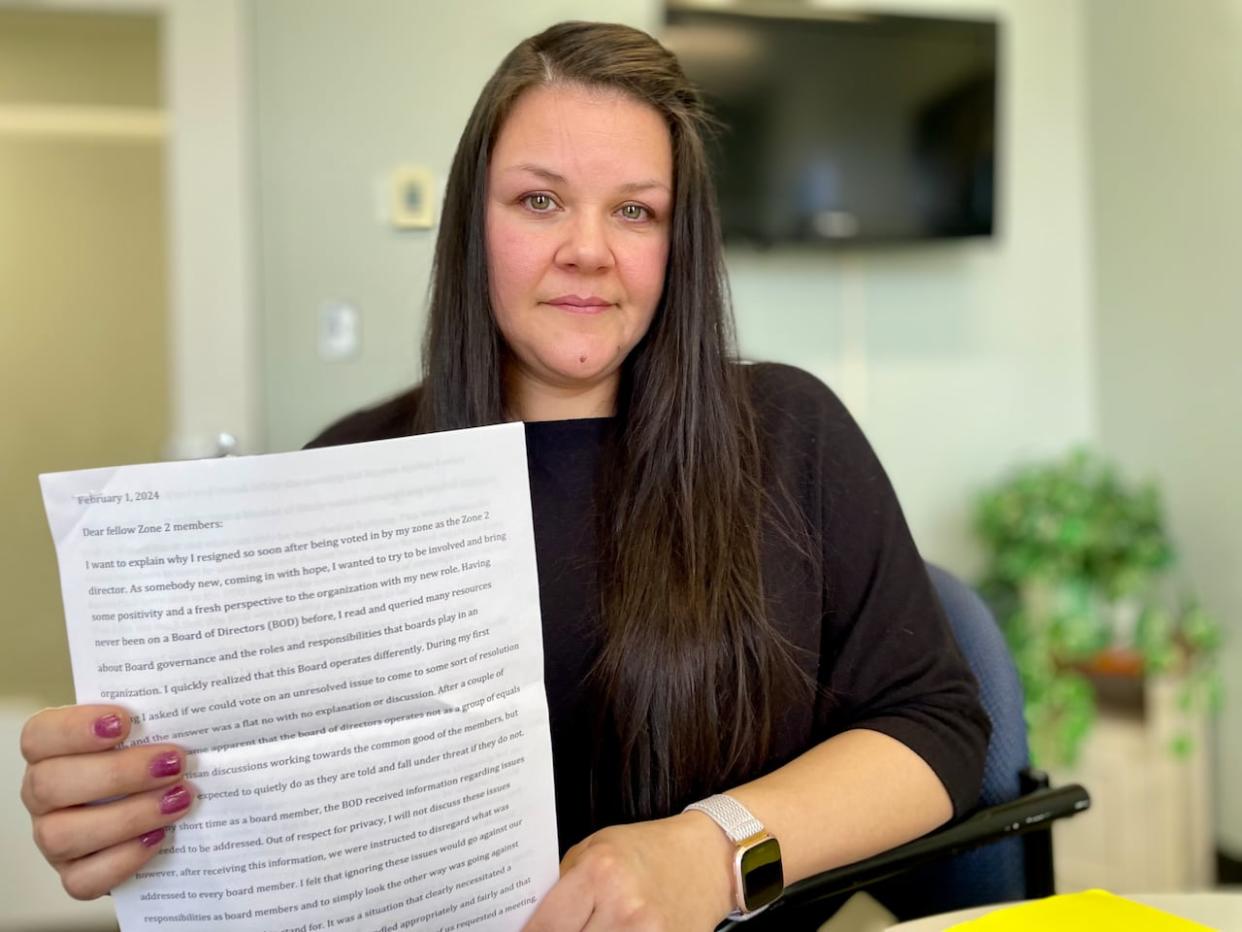
Just months after Lisa Cooper was re-elected president and chief of the Native Council of P.E.I. for a third time, concerns surrounding her leadership have led to a resignation by a board director, and a dispute over who should fill the vacant seat on the board.
The Native Council represents Indigenous Prince Edward Islanders living off-reserve, and runs various programs and services for its more than 1,000 members.
The controversy facing the council stems partly from Mary Busch's resignation from its volunteer board of directors.
Busch was elected to the board in October as one of two directors for Zone 2, which represents members in central P.E.I.
She stepped down from the board in late January, and laid out her reasons for resigning in a speech to members at a Zone 2 meeting a month later.
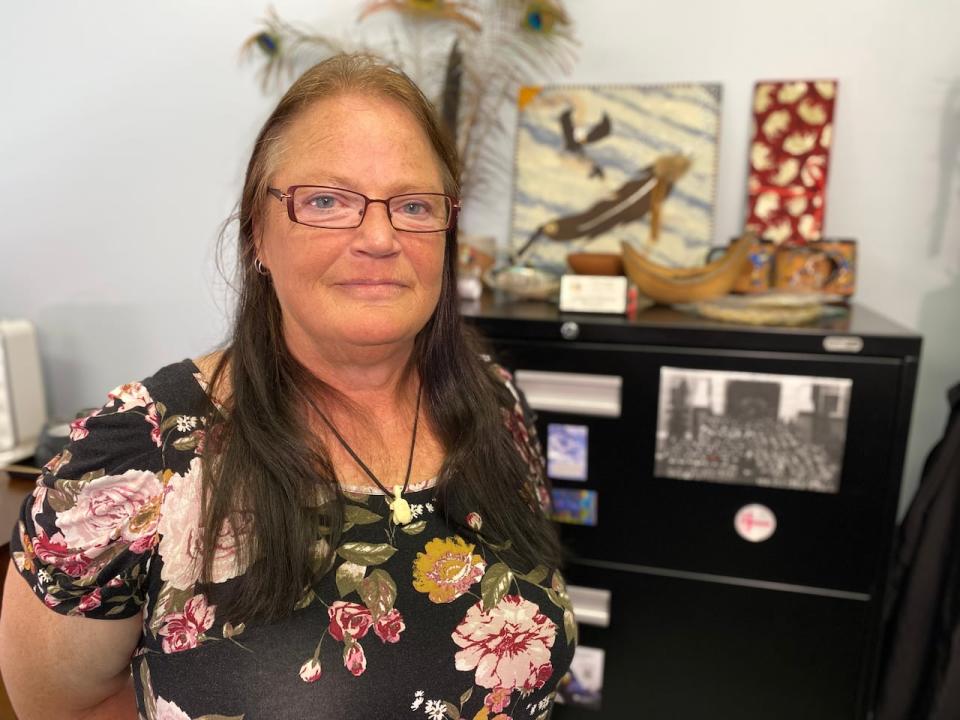
Lisa Cooper, shown in a file photo, was elected president and chief of the Native Council of P.E.I. for a third time in November 2023. (Jane Robertson/CBC)
"It became apparent that the board of directors operates not as a group of equals having nonpartisan discussions working toward the common good of the members, but instead a group expected to quietly do as they are told and fall under threat if they do not," Busch said in her speech, a text of which she later shared with CBC News.
'How could there not be a conflict of interest?'
The board includes nine elected members. According to the council's organizational chart, the board is "responsible for the overall business, affairs, and policy" and "provides direction to the president and chief." The chief chairs board meetings.
But in an interview with CBC News, Busch alleged that during her time on the board, she felt that Cooper exerted far more influence than she should have, with the help of her two sons.
Richard Cooper served as a board director for Zone 1, beginning in the fall of 2022. He resigned on April 5, and accepted a salaried job with the Native Council of P.E.I.
The chief's other son, Bradley Cooper, works as a policy and political advisor for the council and attends board meetings.
I just felt like it was pointless to continue, because I wasn't a 'yes' person. I wanted to ask the right questions and get truthful answers. — Mary Busch, former board director, Native Council of P.E.I.
Busch said at the first board meeting in the fall, it became clear to her that the three Coopers worked together to push the chief's agenda, and pressured others to follow suit.
"I had red flags to begin with," said Busch. "With family members being on the board, it seemed like, how could there not be a conflict of interest when we're trying to vote, or have non-biased discussions on the board?"
Chief accused of confidentiality breach
Busch said she lost confidence in Lisa Cooper's leadership in November, when board directors were sent a formal complaint from a long-time employee of the Native Council. Shared with CBC News, it alleged what the employee called "a severe breach of trust and confidentiality" by the chief.
In an email thread shared with CBC News, Busch and four other board members pushed for a meeting to discuss how the complaint should be handled, particularly given it was against the chief.
Both Lisa and Richard Cooper pushed back against such a meeting, calling the complaint an internal human resources issue that board directors should disregard. They said an investigation would be done internally by an uninvolved investigation team appointed by the chief, per the council's policies and procedures.
They warned that any board involvement at that point could lead to legal troubles for the council.
"It almost seemed like they were trying to cover something up because of the request for a simple meeting, and the responses we got back, and who was involved," said Busch.
"As soon as these issues were brought to our attention, and we were told to disregard them, immediately my confidence was gone. I didn't have faith that these will be handled appropriately."
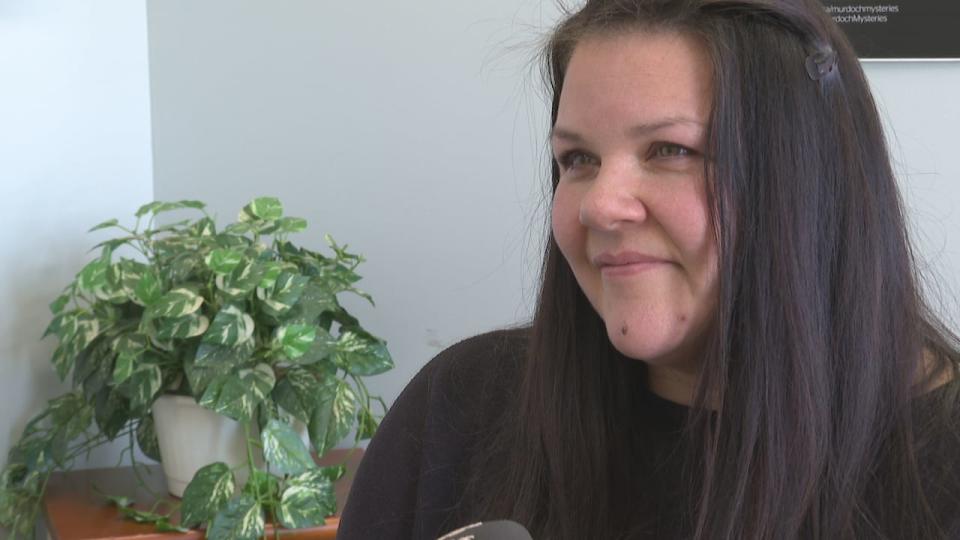
Mary Busch, who resigned as a board director with the Native Council of P.E.I. in January, alleges she was called 'uneducated' by Richard Cooper, and felt she was bullied. (Steve Bruce/CBC)
In a letter to CBC News on March 7, Lisa Cooper later said "board of directors are not involved in the complaint or investigation processes unless and until a request for appeal is brought forward at the conclusion of the investigation.
"NCPEI considers it best practice that the board of directors, as volunteers without an HR background, remain neutral and uninvolved during investigations so that they may properly conduct their role as an impartial appeal body."
Former board member felt 'bullied'
However, the board did eventually meet to discuss the matter. At that meeting, Busch said Richard Cooper told her she couldn't think for herself, and called her "uneducated."
In her resignation speech to members, and again in her interview with CBC News, Busch said she felt "bullied."
"I didn't deserve that just for asking for a simple meeting," said Busch. "And nobody addressed it, not even the leader of the native council. You can just allow that kind of behaviour to happen? If it wasn't her son, if it was someone else, would it have been allowed to happen?"
It was after that meeting Busch said she decided to resign.
"I just felt like it was pointless to continue, because I wasn't a 'yes' person. I wanted to ask the right questions and get truthful answers."
Weeks later, the other Zone 2 director, William Bourque resigned as well.
Telling CBC News he no longer had enough time to dedicate to the board, Bourque declined to comment on Cooper's leadership or Busch's allegations.
Family involvement 'normal and expected'
Richard Cooper has not responded to a CBC News request for an interview.
Bradley Cooper said in an email that Richard resigned from the board on April 5 "to accept a salaried position as our new Kelewatl Commission fisheries monitor. Our bylaws do not allow for an individual to hold both a board of director and salaried position within NCPEI at the same time."
Lisa Cooper also declined to do an interview. She responded to Busch's concerns in her letter to CBC News, sent by Bradley on her behalf.
In her letter to CBC News, however, the chief writes that her two sons' involvement on the board was nothing out of the ordinary.
"It is a common and recurring discussion for small Indigenous communities that there may be family members who serve as directors or as employees at the same time," she writes. "This conversation has been exhaustively discussed within and outside of our community, that family members serving at the same time is normal and expected for small, Indigenous non-profits."
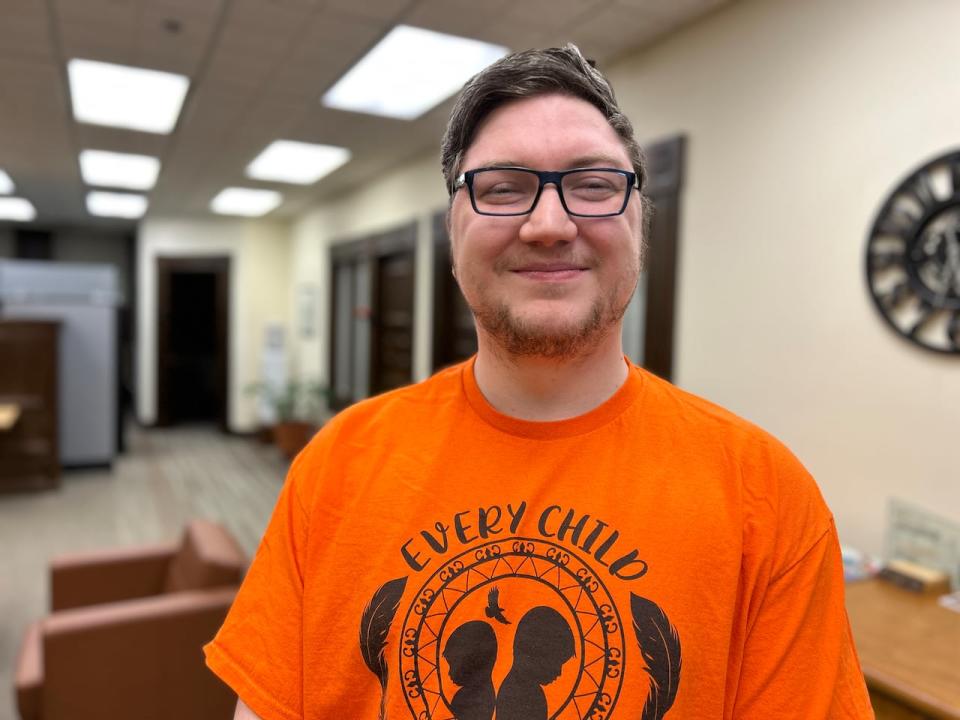
Bradley Cooper, Lisa Cooper's son and a policy and political advisor with the Native Council of P.E.I., attends meetings of the board of the directors. His brother Richard also attended meetings as a director, until his resignation on April 5. (Tony Davis/CBC)
Cooper also disputes Busch's critique of her leadership, and the allegation that she and her sons exert inappropriate influence on the board.
"It is unfortunate that Mary only attended two board meetings to arrive at her judgment," Cooper writes. "Had Mary been able to attend the following annual board retreat held February 24-25, she would have participated in the scheduled board governance training that would have shed light on the expected roles of the board of directors and proper decorum at board meetings.
"Allegations of bullying are taken very seriously by NCPEI and [my] conduct as chairperson, while necessarily firm at times, does not give rise to such descriptions."
Employee resigns amid frustration with investigation
Busch isn't the only person raising concerns about Cooper and the Native Council.
The long-time employee who filed the breach of confidentiality complaint resigned in November.
She declined to do an interview with CBC News.
But at February's Zone 3 meeting, her grievance letter was read out to members, as well as the letter back to her from the council's lawyer appointed to investigate. The draft minutes of the meeting were shared with CBC News.
According to the draft minutes, "all but one" of the 20 members in attendance felt the investigation wasn't handled properly. They raised concerns that "Lisa Cooper did not remove herself from the handling of this grievance" and "determined who was going to investigate."
The draft minutes go on to say the lawyer "gathered information and evidence from only Lisa Cooper and Bradley Cooper. [The complainant] was not included in any aspect of the investigation."
Cooper was ultimately cleared of any wrongdoing.
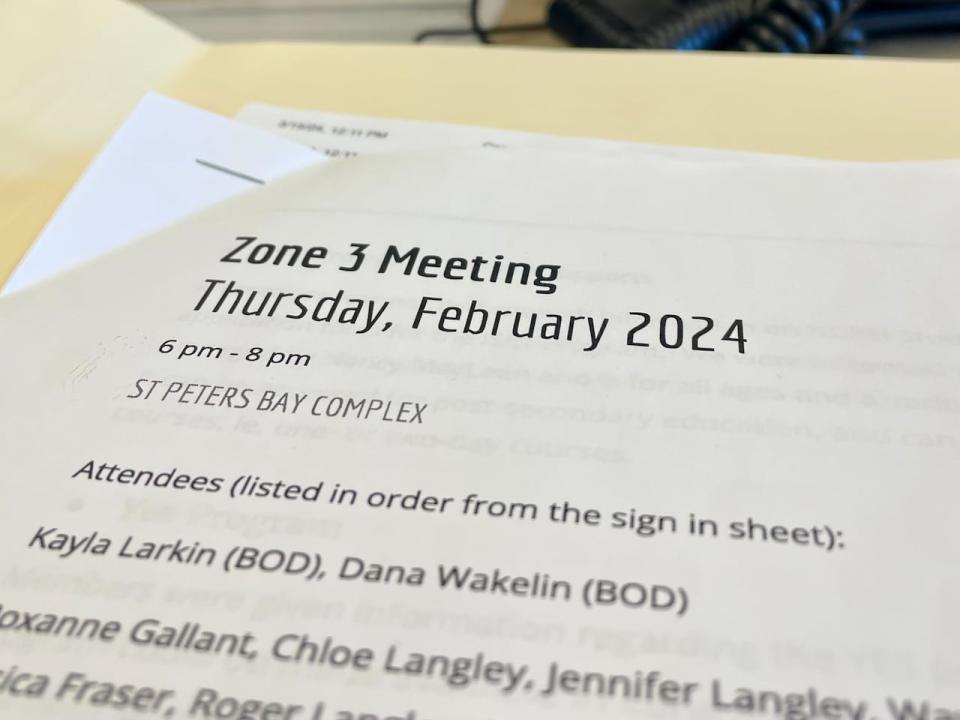
According to the draft minutes of February's Zone 3 meeting, 'all but one' member in attendance were concerned about the Native Council of P.E.I.'s handling of a breach of confidentiality complaint against president and Chief Lisa Cooper. (Steve Bruce/CBC)
The chief said in her letter to CBC News that she can't comment on the specifics of any investigation, but said: "NCPEI handles all complaints and investigations in accordance with the board-approved Policies and Procedures Manual."
She added: "NCPEI makes no comment on a draft set of minutes and cautions that the draft minutes may not reflect a true representation of any discussions that may have occurred."
CBC News has spoken to three members who both attended the meeting and read the draft minutes. They all said the minutes did reflect what was discussed and the concerns raised.
'Decisions being made from the top down'
Lori Sanderson, another member of the native council, says concerns around Cooper's leadership and her impact on the board prompted her to run to fill one of the two board vacancies.
She explained that during her speech at a February Zone 2 members' meeting that Lisa and Richard Cooper attended. Sanderson provided CBC News with a copy of that speech.
It read: "NCPEI was originally structured in a way that the board was directed by the members, and the chief was directed by the board. This no longer seems to be the case... I feel things have changed over the years, with what seems like more decisions being made from the top down.
"I am not going to sit at a board meeting and simply nod my head in agreement because it's expected."
Sanderson was one of three people running for the two seats on the board. At the meeting, members voted her in.
However, as explained by Lisa Cooper in her letter to CBC News: "NCPEI's bylaws do not currently allow for zones to directly elect interim directors for vacant positions, and as such the names of recommended candidates must still be submitted to the board of directors for appointment."
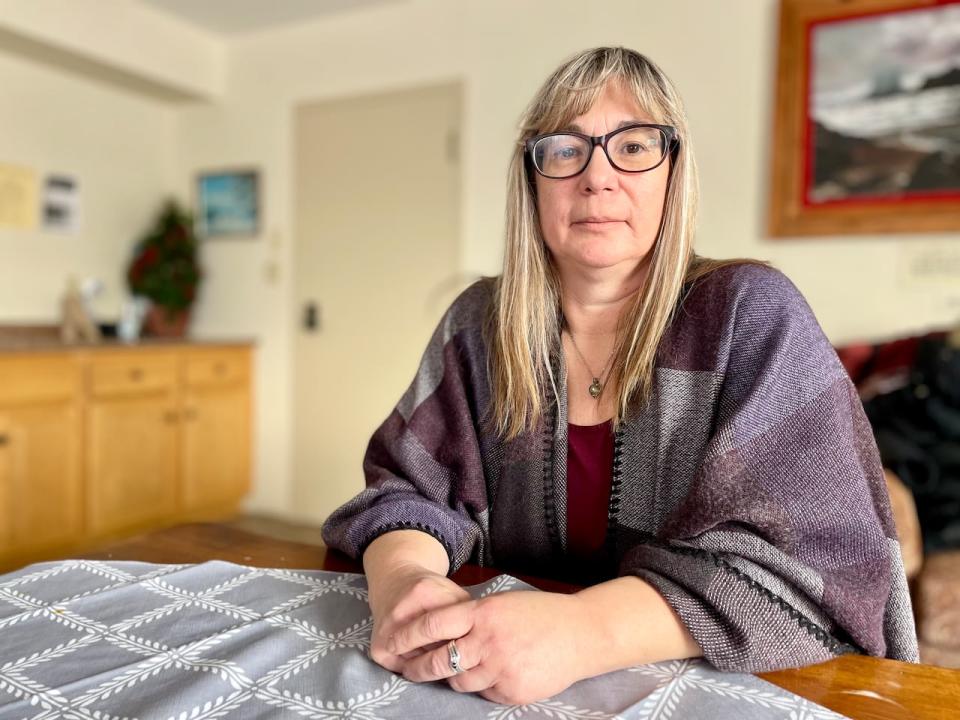
Lori Sanderson ran to fill one of the two vacancies on the Native Council of P.E.I.'s board of directors in February. She was supported by the membership at that meeting, but rejected by the board. (Steve Bruce/CBC)
At a closed-door board meeting, directors rejected Sanderson as a board member.
Bradley Cooper informed her of that in an email, later shared with CBC News.
"The board of directors proposed a motion to appoint you for a vacant Zone 2 director position and unfortunately the motion did not pass with the required 75 per cent majority specified by our bylaws."
Sanderson said she was disappointed, but not surprised.
"I think [Lisa Cooper] was against me being on the board, because I don't just agree with everything, and rubber-stamp everything," she said.
"It's kind of consistent with other decisions that have come, where if she's in support of something, there are some on the board who will automatically agree with her. Then there are some who might hold out for a little bit, and then give in, or they're intimidated by her or her son...So I think it's just kind of a 'here we go again.'"
Dispute over proof of Indigenous ancestry
Sanderson said she was never given a reason why the board voted her down.
But in an email to CBC News, Bradley Cooper said: "It was determined at the time of the board meeting that Lori was ineligible for the position as a member with unverified Aboriginal ancestry."
Sanderson said those running for board positions are required to verify their Indigenous ancestry with a certified genealogist letter. She said she submitted the letter and supporting documents to the Native Council in December. She also shared the letter and documents with CBC News.
"I really don't think that's the reason. I think there's something else going on," said Sanderson. "I had submitted my intent to run back in January... It should've been verified back in January. So at that time, anybody who was running, they should've looked at those files ahead of time."
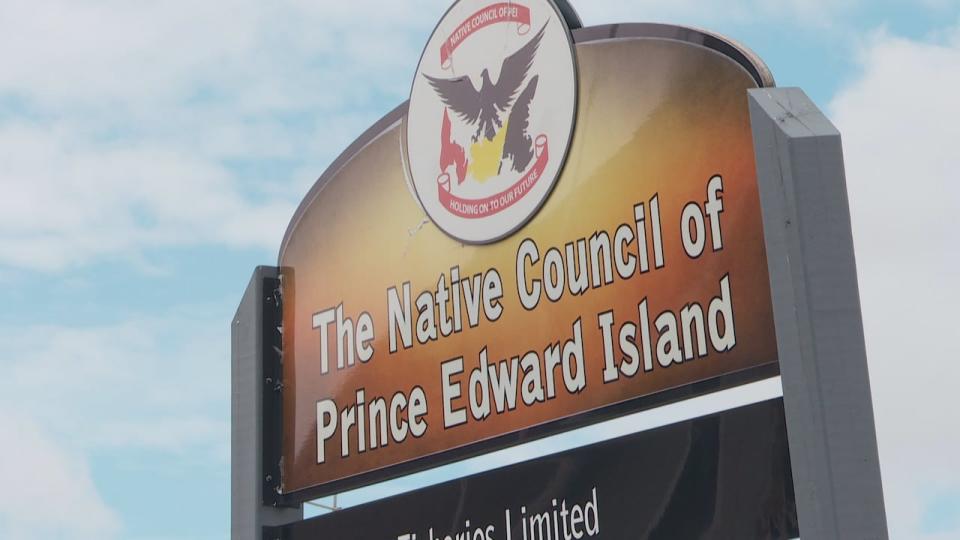
The Native Council of P.E.I. represents Indigenous Islanders living off-reserve, and runs various programs and services for its more than 1,000 members. (Laura Meader/CBC)
Busch said the fact Sanderson was denied the seat by the board, despite being supported by the membership, has added to her own frustration.
"It is discouraging to have someone else come in, who wants to make positive change, and whose perspectives align with my own and others for positive change for the council. And then to have that denied — it is discouraging," she said.
This is our last stand to make them listen. — Lori Sanderson
It's not clear what will happen with the remaining vacant position on the board of directors.
Both Busch and Sanderson are hoping their decision to speak out will ultimately lead more members to push for change at the Native Council.
"A lot of people are scared to speak out, especially on the record," said Sanderson.
"But we're not just complaining behind the scenes anymore. There are things being done that the membership is not happy with. And if the president and chief isn't listening, if the board and executive aren't listening, this is our last stand to make them listen."

